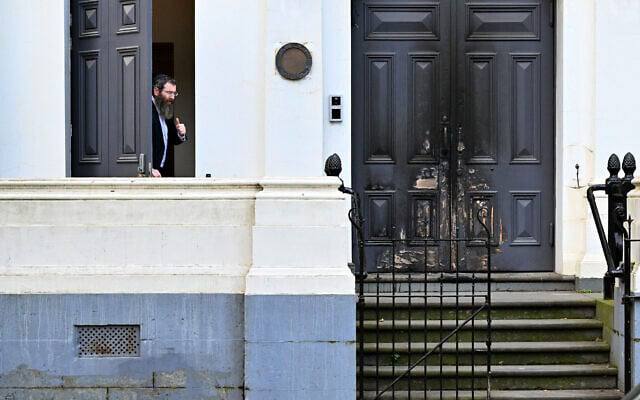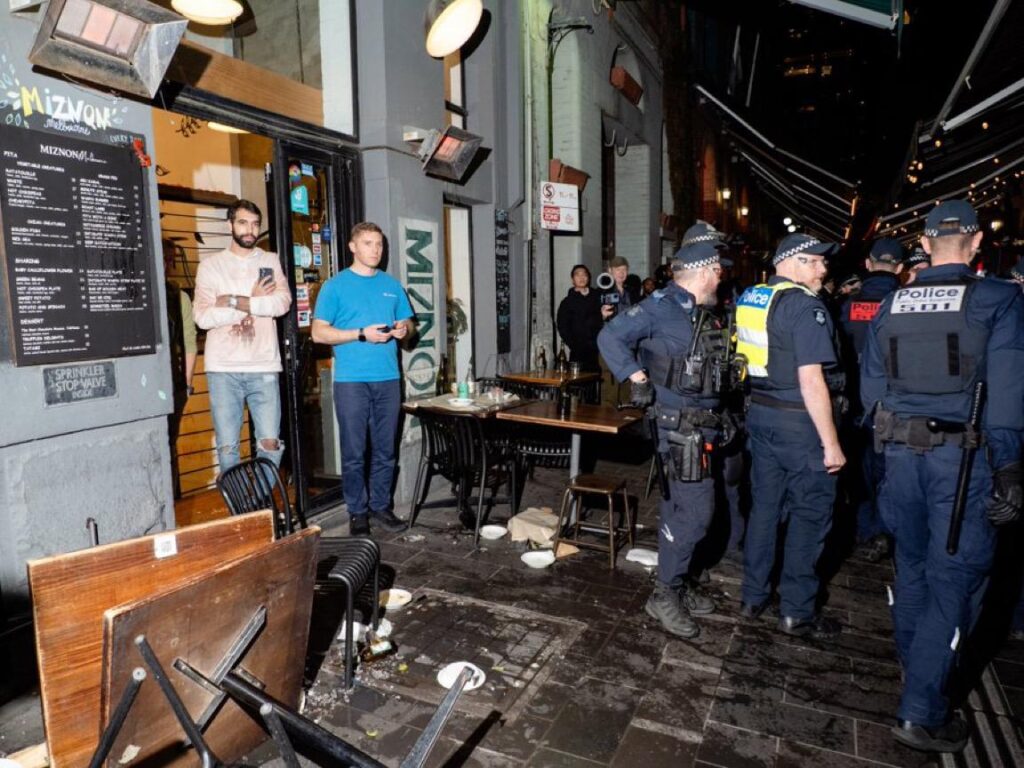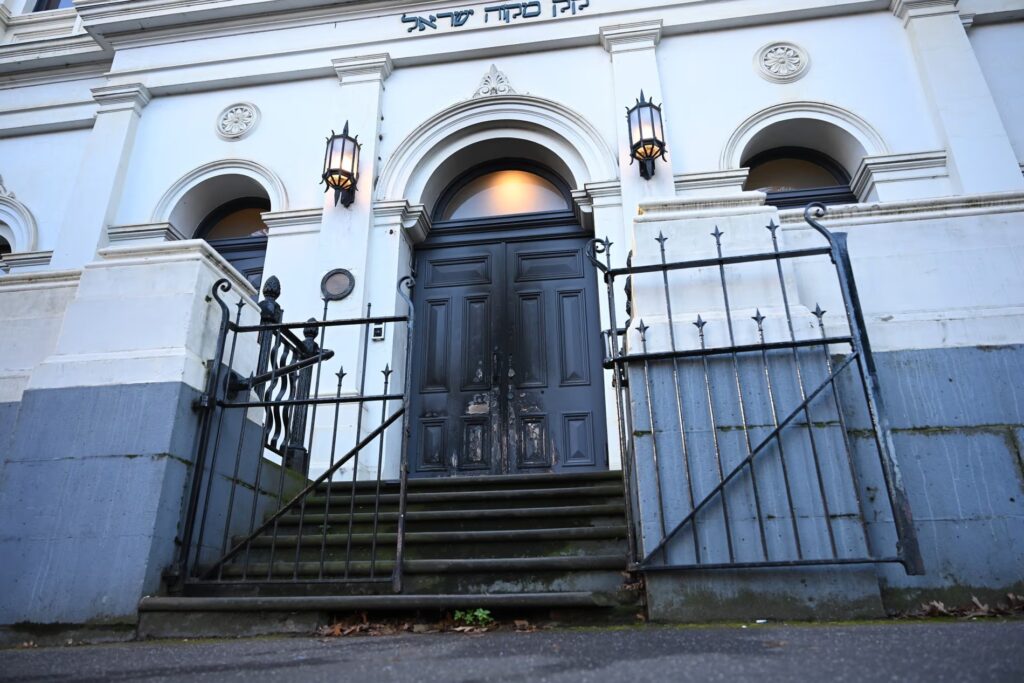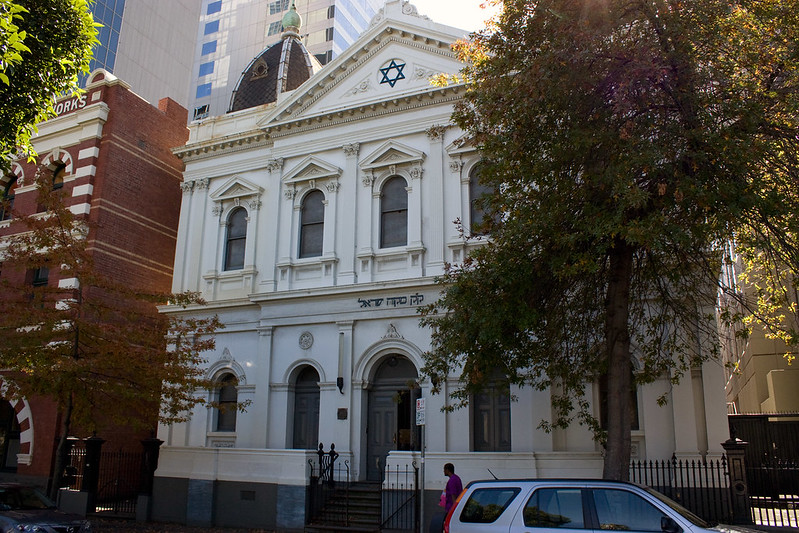UPDATES
Israel hosts unprecedented summit with Arab leaders
March 28, 2022 | AIJAC staff
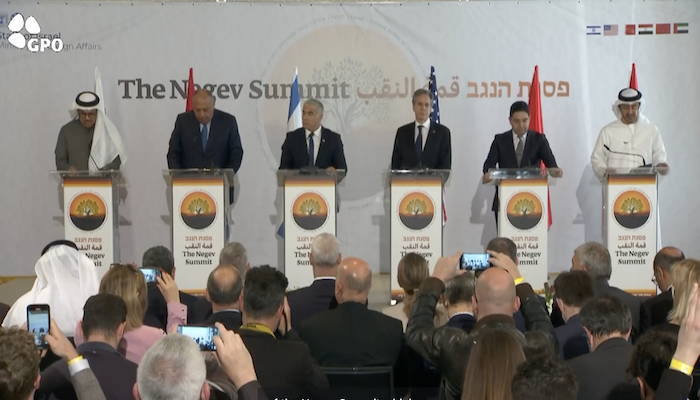
Update from AIJAC
03/22 #04
This Update is devoted to a summit meeting currently taking place in Israel that would have been completely unthinkable a mere two years ago. Israel is currently hosting the Foreign Ministers of the UAE, Bahrain, Egypt and Morocco, as well as US Secretary of State Antony Blinken, for a two-day meeting at a hotel in Sde Boker, in the Negev Desert of southern Israel.
We lead with David Horovitz, Editor of the Times of Israel, who discusses why this gathering is so significant and unprecedented. He says the summit effectively upgrades relations between Israel and all four of the countries involved. He also explains the reason these countries feel obliged to work together in such an unprecedented way – because they feel they have to unite in the wake of a US Administration determined to strike a deal with Iran that all these countries are extremely concerned about. For Horovitz’s explanation in full, CLICK HERE.
Next up is Jerusalem Post senior contributing editor Herb Keinon who focuses on the contrast between this unprecedented Summit and growing efforts to delegitimise Israel’s existence by groups like Amnesty International, which just falsely declared Israel an “apartheid state”. Keinon notes that Amnesty and similar groups are part of a campaign to turn Israel into a pariah state – but this summit shows the trend is the other way, and Arab states are increasingly accepting Israel’s legitimacy after more than 70 years of denying it. He also notes the symbolic significance of the summit taking place in Sde Boker, home and burial site of Israel’s founding Prime Minister David Ben Gurion. For the rest of his analysis, CLICK HERE.
Finally, three reporters from the Wall Street Journal, David Cloud, Dov Lieber and Stephen Kalin, explore the larger regional geopolitical shifts that made the Sde Boker summit possible. This is more than just a fear of Iran, but also involves growing concern that US support for regional allies is unreliable, as well as some new relationships between Arab states and Russia. The three reporters also point out that the summit is likely to lead to even more unprecedented Israeli relations with these four Arab nations, noting it reportedly involved discussion of “unprecedented, formal defence partnerships, as well as new military and economic ties and a joint strategy for Iran.” For this valuable look at how the summit fits into changing wider regional alignments, CLICK HERE.
Readers may also be interested in…
- A Jerusalem Post editorial on the Sde Boker summit.
- More comment on the summit from several experts consulted by the Jewish News Syndicate.
- New York Times columnist Bret Stephens makes a strong case that the proposed new Iran nuclear deal will badly hurt US standing both in the Middle East and around the globe.
- Some examples from the many stories and comments now appearing at AIJAC’s daily “Fresh AIR” blog:
- Ahron Shapiro discusses the two murderous Islamic State-linked terrorist attacks which have struck Israel over the past week, and whether they could be part of a broader trend.
- Tammy Resnik details Israel’s humanitarian aid efforts to Ukraine, and where they fit into Israel’s long tradition of providing such aid.
- AIJAC’s latest webinar with US expert Dr. Jonathan Schanzer, on the subject of “Iran, Russia, and a potentially disastrous new US-brokered nuclear deal.”
- A short video introducing an AIJAC guest currently visiting Australia – Olga Deutsch, Vice-President of NGO Monitor. Details of her public speaking engagement in Melbourne tomorrow are here.
Negev Summit shows Israel’s new legitimacy, and the common imperative to tackle Iran
There’s symbolism aplenty in the gathering of regional ministers at the home of Israel’s founding prime minister — and an urgent practical agenda
By DAVID HOROVITZ
Times of Israel, 26 March 2022

The logo of the six-nation summit being conducted at Sde Boker in the south of Israel on Sunday and Monday.
The speed with which the Sunday-Monday “Negev Summit” has been pulled together, the storied location, and the expanding list of participants, combine to underline the significance of this unprecedented get-together of foreign ministers in Israel.
Being hosted by Foreign Minister Yair Lapid at Sde Boker, the Negev home and burial place of Israel’s founding prime minister David Ben-Gurion, the gathering at so resonant a locale constitutes further dramatic symbolic confirmation of Israel’s legitimacy and regional importance by Abraham Accords partners Morocco, Bahrain, and the United Arab Emirates.
Their foreign ministers will, simply by their presence, be upgrading relations with the country Ben-Gurion was so central to establishing. There is even talk of a photo opportunity at Ben-Gurion’s grave.
Joined by visiting United States Secretary of State Antony Blinken, Israel’s new regional allies will also be gathering along with the foreign minister of the country’s first peace partner, Egypt, for formal and less formal meetings, consultations, and meals. These talks come just a week after Egypt’s President Abdel-Fattah el-Sissi hosted Prime Minister Naftali Bennett and the UAE’s Crown Prince Mohammed bin Zayed al-Nahyan for a markedly warm and well-publicized summit of his own. Efforts have been ongoing to add Jordan’s foreign minister to the list — in vain, as of Saturday night.
In fact, the Negev Summit coincides with a planned visit to Ramallah by Jordan’s King Abdullah, designed to help find ways to alleviate Israeli-Palestinian tensions in the run-up to the fraught Ramadan period. Blinken, who will be holding talks with Israeli leaders and with Palestinian Authority President Mahmoud Abbas Sunday before he heads south to Sde Boker, would doubtless have been pleased to see not only Jordan but also Abbas at the Negev Summit.
But Bennett, opposed to negotiating with the PA president, would have resisted this. Abbas’ standing among the Palestinians, already low, would hardly have been strengthened by his attending a diplomatic festival somewhat honoring Israel’s founding premier. And, in any case, the Palestinian leader is largely irrelevant to the agenda that is bringing these ministers together.
For Israel’s boosted regional legitimacy is central not merely to the location of this summit, but to its core focus — the effort to muster an effective alliance against the common threat, Iran.

Israeli PM Naftali Bennett, Egyptian President Abdel Fattah al-Sisi and Crown Prince of Abu Dhabi Mohammed bin Zayed held a joint meeting in Sharm El-Sheikh last week. (photo credit: Israeli Prime Minister’s Office)
As with the Abraham Accords themselves, regional heavyweight Saudi Arabia will be absent from the Sunday-Monday proceedings but present in spirit, and potent behind-the-scenes. Jerusalem and Riyadh, though not formally allied, are working to bolster regional unity against Tehran — not rhetorically but practically, via intelligence sharing, the development of regional missile alert and defense systems, and more.
Behind the handshakes and the smiles, it is the US secretary who may find himself something of the awkward guest at this extraordinary gathering. He will be bringing news of the progress toward a revived P5+1 nuclear deal with Iran, designed to rein in the ayatollahs’ rogue nuclear weapons program in return for the lifting of sanctions and, possibly, the delisting of Iran’s global-troublemaking Islamic Revolutionary Guard Corps as a terrorist entity.
Bennett is a strident opponent of a revived deal; Lapid has said he would rather the US walk away from the talks than strike a bad deal. The other participants in the Negev Summit, and the Saudis watching from home, share a deep concern that Iran will be both empowered, emboldened, and enriched by the deal that is taking shape, and a realization that the US has all-too-many other global challenges to grapple with.
It was, of course, the US, and specifically the Trump administration, that brought the UAE, Bahrain, and Morocco together with Israel in the Abraham Accords, a process that has helped modern Israel gain greater recognition than ever before in this region.
The Negev Summit signals that these new partners are now working together more closely than ever, simply because they have to — in part because they know that the US now has other preoccupations and priorities, and fear that it underestimates the dangers posed by Iran.
Negev Summit reflects vastly changing Middle East landscape – analysis
Just as Amnesty International and organizations of its ilk are strenuously trying to make Zionism illegitimate, turn it into a dirty word, much of the Arab world is coming to grips with it.
By HERB KEINON
Jerusalem Post, MARCH 27, 2022

The Kedma hotel at Sde Boker, where the six-nation summit is being held.
When Amnesty International declared Israel an apartheid state last month, its agenda was clear: Turn the Jewish state into a pariah, a country that will be shunned by the international community.
How ironic it was, therefore, that just a couple of weeks later, Israel – represented by Prime Minister Naftali Bennett – turned up as one of the main actors on the international stage mediating between Ukraine and Russia in one of the most severe global crises since World War II.
Some pariah.
And now this: Four Arab foreign ministers were to gather in Israel Sunday evening along with US Secretary of State Antony Blinken and Foreign Minister Yair Lapid for an unprecedented summit.
That the summit is taking place in Israel rather than, say, Sharm e-Sheikh, the traditional venue for these types of meetings, is one thing. But that it is taking place in Sde Boker, the post-prime-ministerial residence of David Ben-Gurion, Israel’s founding father and someone who can be rightly termed Mr. Zionism, is nothing less than stunning and a powerful message.

David Ben-Gurion takes former Canadian premier Lester B. Pearson for a walk around Sde Boker in, 1968. (credit: YOSSI GREENBERG / Israel’s Government Press Office)
Just as Amnesty International and organizations of its ilk are strenuously trying to make Zionism illegitimate and turn it into a dirty word, much of the Arab world is coming to grips with it. Not, of course, because of any great sympathy for what it represents, but rather because of the recognition that in a hate-filled region full of malevolent actors with medieval ideologies, Israel is a relatively benign actor.
Compared with Iran, moreover, it is downright benevolent. And it is this well-disposed – and powerful – actor with whom these Arab states realize it is in their interests to cooperate.
So, to Sde Boker will travel the foreign ministers of Egypt, the United Arab Emirates, Morocco and Bahrain. Egypt, the pillar of the Arab world; the United Arab Emirates, the purse; Morocco, the chair of the Organization of Islamic Cooperation’s Al-Quds (Jerusalem) Committee; and Bahrain, Saudi Arabia’s surrogate. That’s a strong lineup.
Noticeable by their absence, however, are Saudi Arabia itself, Jordan, the Palestinian Authority and Sudan.
Saudi Arabia still has not screwed up the courage needed to take its relationship and cooperation with Israel to the public level. But it will eventually, and attacks like the one by the Houthis on the Aramco refinery in Jeddah on Friday will only speed up that process.
Jordan is walking a tightrope between its interest in joining this moderate Sunni-Israel camp on the ground floor and the anti-Israel sentiments of the Jordanian population – the majority of whom are Palestinian – which King Abdullah has been all too willing to let seethe over the years. In a sign of domestic instability, the Jordanians have arrested dozens of people in the last couple of weeks, and joining the meeting in the Negev at this time might just lead to further domestic agitation.
Sudan, the fourth of the Abraham Accords states – along with the UAE, Bahrain and Morocco – is still roiled by its own domestic political crisis and is in no position to take part in a trailblazing Mideast summit like the one in the Negev at this time.
THE PA, as always, is just too weak and blinded by its own narrative of victimhood to realize that this alliance presents it, as well, with tremendous opportunities. So PA President Mahmoud Abbas will stew in his own bitterness, anger and frustration, sufficing with a visit on Monday from Blinken and Jordan’s King Abdullah, who are trying to ensure that violence in the West Bank does not boil over. In the meantime, the proverbial caravan moves on.
And the wagons in this particular caravan are going to the Negev, where they will circle to defend against a common enemy and mutual threat: Iran.
In 2015, the last time the US moved forward on an Iran nuclear deal, Israel took the public lead in fighting it, with then-prime minister Benjamin Netanyahu going toe-to-toe with US president Barack Obama, who wanted the deal then as bad as President Joe Biden’s top Iran negotiator, Rob Malley, wants it today.
Back then, the Sunni Arab world stood in the background and silently cheered, hoping that Netanyahu’s in-your-face approach would work, but was unwilling to publicly join him in the fight.
This time around, Israel is not taking nearly as public a stand against the deal as it did before. Yet Blinken is sure to hear from all five foreign ministers at Sde Boker on Monday their deep disappointment and misgivings that Washington is again racing ahead with the deal, ignoring the better counsel of those who will be most affected by it. This time, it will not be Israel speaking alone against the deal, but Israel speaking together with Egypt, the UAE, Morocco and Bahrain, standing in for Saudi Arabia.
Will it convince the Americans? Highly unlikely.
But it may shift the conversation from focusing on whether the deal will knock Iran off the nuclear track – the US and European powers believe it will, Israel and the Arab states represented in the Negev Summit believe it will not – to whether it will embolden Iran’s destabilizing efforts in the region, something Israel, Egypt, Morocco and some of the Gulf states believe with complete certainty will happen.
The Gulf states are speaking more openly now against the deal because the threats they face from Iran are not only a possible nuclear threat a few years down the line, but rather the very real and immediate attacks they are experiencing today from Iran’s proxies.
Houthi attacks on Saudi, UAE and Bahrain targets can only be expected to increase once an Iranian nuclear deal is signed and – as a result of that deal – money pours into Iran, enabling Tehran to better fund its proxies. Egypt and Morocco stand to suffer from attacks by Iranian proxies as well, to say nothing of Israel.
Then there is the nuclear component.
“Israel will do anything we think is needed to stop the Iranian nuclear program,” Lapid warned Sunday at a press conference in Jerusalem alongside Blinken.
Those words are by no means new, and Israeli government officials have been repeating them now for nearly three decades.
What is new, however, is the message being sent by the participation of central Arab countries at the Negev Summit: participation that says they might help Israel do what it believes it must to stop Iran’s nuclear march.
Foreign reports of the downing of two Iranian drones outside Israel’s borders last month, and an attack soon thereafter on a drone warehouse in Iran attributed to Israel, indicate that this help may already be something that is being rendered.
A Middle East Geopolitical Realignment Accelerates to Confront and Contain Iran
A first-ever diplomatic summit in Israel illustrates the new relationships being built across the region as the U.S. rethinks its security role in the Mideast
By David S. Cloud in Dubai, Dov Lieber in Sde Boker, Israel, and Stephen Kalin in Riyadh, Saudi Arabia
Wall Street Journal, Mar. 27, 2022

US Secretary of State Antony Blinken meeting with his Israeli counterpart Yair Lapid last year: Blinken can expect to confront a great deal of concern – from both Lapid and Arab foreign ministers – over a possible new nuclear deal with Iran (Photo: Wikimedia Commons | Licence details.)
New diplomatic and security ties are reshaping the Middle East as former enemies seek unity in containing Iran, the U.S. rethinks its security role in the region, and Russia and China seek to exploit openings left by Washington.
A historic summit starting Sunday in Sde Boker, Israel, illustrates the changing alignments, bringing Arab, Israeli and U.S. officials together for the first time on Israeli soil for talks on expanding their budding partnership.
Israeli and Arab diplomats said they were discussing unprecedented, formal defense partnerships, as well as new military and economic ties and a joint strategy for Iran.
Driving much of the realignment are new fissures between the U.S. and its allies over still-unfinished negotiations on a nuclear pact with Iran and now the war in Ukraine, as the Biden administration struggles to persuade Israel and Saudi Arabia to embrace its positions on engaging with Tehran and isolating Russia.
The summit drew together U.S. Secretary of State Antony Blinken with the top diplomats of Israel as well as Bahrain, Morocco and the United Arab Emirates—the three Arab countries that normalized relations with Israel in 2020 in the so-called Abraham Accords—in the town of Sde Boker in the Negev Desert, where Israeli founding father David Ben-Gurion retired. Egypt’s top diplomat is also joining the summit in a last-minute addition, the latest signal that the country that first signed a peace deal with Israel in 1979 is ready for warmer relations.
“A more stable, integrated region gives us a stronger foundation for addressing shared threats like these,” Mr. Blinken said Sunday, calling the summit a gathering that would have been “unthinkable just a few years ago.”
But the talks on Sunday and Monday aren’t expected to answer whether the Abraham Accords could expand into a formal defense alliance and the role the U.S. would have in any new military relationship. The Israeli-Palestinian conflict, the issue that has long divided Israel from its Arab neighbors, was planned to be discussed, but isn’t the overarching goal of the gathering.
“The most important issue is sitting together,” said Amir Hayek, the Israeli ambassador to the U.A.E. “It’s telling the world that the region is united.”
Israel and its new Arab partners are accelerating talks centered on missiles and air-defense systems aimed at countering Iran’s large arsenal of medium-range missiles and armed drones.
Saudi Arabia, which has held back on normalizing relations with Israel, has held quiet talks with Israel on closer military cooperation, according to a senior U.S. official. Saudi Arabia and the U.A.E. have watched their cities and oil facilities targeted in recent years by Iranian-supplied missiles and drones—sometimes with only a token U.S. response.
The summit is taking place as Israel on edge following the worst terrorist attack in years in the Negev desert city of Beersheba last week, which left four Israelis dead.
On Sunday night, while the diplomats were waiting to start their dinner, two people were killed and three police officers injured when a gunmen opened fire in the town of Hadera in central Israel. The assailants were fatally shot by undercover policemen who were near the incident when it occurred.
The Arab diplomats in attendance condemned the attack, via the Israeli foreign affairs department.
Last week, Israeli Prime Minister Naftali Bennett traveled to the Egyptian resort city of Sharm El Sheikh to meet Egyptian President Abdel Fattah Al Sisi and de facto Emirati ruler, Sheikh Mohammed bin Zayed al Nahyan, the Abu Dhabi crown prince. The leaders discussed deepening security and economic ties and countering Iran as a nuclear deal approaches, according to people familiar with the talks.
Rejoining the nuclear pact was President Biden’s most important foreign-policy campaign promise, but it is divisive in the Middle East, where Israel and most Arab governments oppose it. They fear that lifting sanctions on Iran will embolden its leaders and that the U.S. will pull further back from the Middle East, following Mr. Biden’s abrupt withdrawal from Afghanistan last summer and his long-term foreign policy goal of pivoting toward China.
Mr. Blinken was expected to brief the officials at the summit on the final stages of nuclear negotiations, officials said. U.S. and Iranian officials say they are on the cusp of a deal, but the last sticking points around sanctions on Iran’s powerful Revolutionary Guards force have held up an agreement for weeks.
Other longtime rivalries and relationships are changing, recasting the geopolitics of the region. Qatar is back in the Gulf Arab fold following a three-year boycott by its neighbors. The U.A.E. and Saudi Arabia are in talks with Turkey, another regional heavyweight, after years of animosity. The U.A.E. is leading Arab efforts to renew ties with Syrian President Bashar Al Assad despite his actions in a brutal civil war, hoping to reduce Iran’s influence in the neighborhood.
In another sign of that shift, the Persian Gulf’s oil-rich monarchies and Israel are staying neutral or tempering their criticism of Russia’s invasion of Ukraine despite Washington calling for them to back Kyiv. The de facto leaders of Saudi Arabia and the U.A.E. have spoken with Russian President Vladimir Putin but declined calls from President Biden in the weeks before the invasion. Riyadh has also invited Chinese President Xi Jinping to visit this year and accelerated talks with Beijing about pricing oil sales to China in yuan, The Wall Street Journal has reported.

Saudi King Salman with Russian President Vladimir Putin: In a sign of shifting alignments and decreased trust in US leadership, Gulf monarchies are refusing to side with the US against Russia in the wake of the invasion of Ukraine (Image: Wikimedia Commons | Licence details).
The Gulf states have formed deep ties with Moscow in recent years, creating an energy alliance between the Organization of the Petroleum Exporting Countries that has done little to stop oil prices from rocketing during Russia’s invasion.
Meanwhile, Saudi Arabia and the U.A.E. are also pursuing closer diplomatic and economic ties with Iran in an attempt to raise the bar for a possible regional conflict. Those talks stalled this month after Saudi Arabia executed 81 people, including dozens of Shiite Muslims, in the largest mass execution in the country’s history.
“The idea that the U.S. is going to be a provider of security, I don’t think they put as much stock in it as they once did,” said Steven Cook, a senior fellow at the Council on Foreign Relations think tank. “All the incentives seem to run in the opposite direction.”
U.S. officials say privately that the White House is hopeful the nuclear deal will help ease tensions with Iran. It could easily be drawn back in if the nuclear deal falters or Tehran and its supporters step up attacks that threaten oil supplies or Israel.
If the nuclear talks are successful, some diplomats in the region say they hope they are followed quickly by international negotiations on Gulf security that would include Iran and the U.S. Tehran and Washington have separately raised the possibility of follow-on talks to address issues left unresolved in the nuclear accord, according to a Middle East diplomat.
The coalescing of a new Arab-Israeli alliance indicates the waning of a long-held notion, often advanced by Arab leaders themselves, that Israel would first need to end its century-long conflict with Palestinians before being welcomed in the region. Still, Jordan, a close ally of the Palestinians, though invited, didn’t send its own foreign minister to the Israeli summit.
King Abdullah II of Jordan is slated to meet with Palestinian Authority President Mahmoud Abbas in Ramallah on Monday, and those two will have a three-way meeting with Egyptian President Sisi in Amman on Tuesday, according to an official in Mr. Abbas’s office.
Wary of angering its own allies in the region, the Palestinian Authority has stayed mum on the summit in Israel and Palestinian officials didn’t respond to requests for comment.
Benoit Faucon, Courtney McBride and Fatima AbdulKarim contributed to this article.
Tags: Abraham Accords, Israel, Middle East


